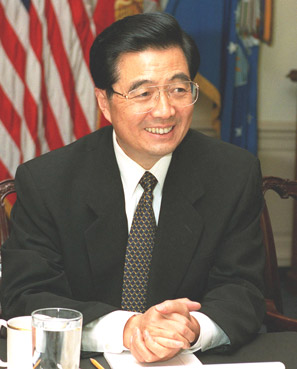SEYCHELLES WELCOMES CHINESE PRESIDENT

The Seychelles government will roll out the red carpet to welcome Chinese President, Hu Jintao, today at the Seychelles International Airport.The visit will mark the first time that a Chinese leader has set foot on Seychelles soil. Who is Hu Jintao and why has he included Seychelles in his itinary?
Hu Jintao was born in eastern Anhui province in 1942. The shopkeeper's son enjoyed his first break by entering Beijing's elite Qinghua University, where he secured the much-prized party membership. University roommates remember a serious student who seldom laughed at their jokes. Hu was also fortunate to graduate in 1965, just before Mao's Cultural Revolution closed all schools and colleges. In 1968, like the rest of his generation, Hu was banished to labour in the Gansu countryside in China's northwest, where he worked as a labourer.
The experience prepared him for a series of government postings in China's wild west. In 1988, Hu was trusted with the sensitive party secretary job in Tibet, where he proved his mettle by dispersing demonstrators and imposing martial law in March 1989. Hu spent little time in Lhasa, apparently a victim of altitude sickness. Some rumours suggest heart trouble, but he used his sick leave to good effect, cultivating contacts in Beijing. In 1992, he rose to the yet more rarefied air of the Politburo Standing Committee. In 2003 Hu became the President of the world's most populous nation after he was elected Chairman of the People's Republic of China.
Yet the former hydroelectric engineer, whom Tibetan activists say has blood on his hands from his time as party boss in Lhasa, has never visited Europe, or the United States, and remains a mystery even in his own land. President Hu Jintao is currently the Chairman of the People’s Republic of China, Secretary General of the CPC Central Committee, vice- chairman of the CPC Central Military Commission, vice-chairman of the Central Military Commission of the People’s Republic of China.
His interest in Seychelles is unclear but political analysts have pointed out that the allure of potential massive oil fields and Seychelles strategic position in the Indian Ocean may not have escaped the attention of the Chinese, especially since the Americans have a massive military presence next door on Diego Garcia.
At a press conference called by the resident Chinese Ambassador last week, we asked him what is China getting in return for all the financial aid it has given and continues to give to Seychelles? The Ambassador, quite diplomatically replied that China helps all its friends and do not expect anything in return. Of course anyone in his right mind would take this response with a pinch of salt.
Whilst here, Jintao is expected to announce that China will write off Seychelles debts to China and sign a Sino-Seychelles bilateral accord which will enable China to benefit from the lucrative tuna fishing industry. Further, China is set to assist Seychelles in its oil exploration effort, explore the possibility to use Seychelles as a transhipment port to export their goods to Africa, and generally play a more direct role in the Seychelles economy. The Chinese are already heavily involved in the construction industry which currently enjoys a boom in the Seychelles. Although a Communist Country, China, unlike Seychelles, has proved itself not averse to capitalism. The Country has enjoyed consecutive economic growth in the region of 10% annually, raising the concern of economist worldwide of over heating. After decades of mismanagement under Communist dictatorship, China’s economy today is the sixth largest in the world. Despite the huge population it has, however, its economy is still only about half the size of the United States but it is expected to grow further.
The Seychelles-China relationship evolved as a cold war accommodation, according to former President James Mancham, who admitted that he ditched his personal friendship with the rulers of Taipei in favour of the Communist government on the mainland at Independence. After all, even America had abandoned Taiwan in 1972 to recognise China by giving it a seat at the UN with a veto power. During the one-party state Mr Rene made five official visits to China, one of the few countries where he was given the red carpet treatment. It remains to be seen how this cozy relationship will evolve further, but the choice of Seychelles among the 7 countries may be just an opportunity for Mr Hu to take a well deserved rest before his long flight back to Beijing. Whatever the reason, the people of Seychelles and this newspaper bid a warm welcome to the Chinese President and his entourage.


